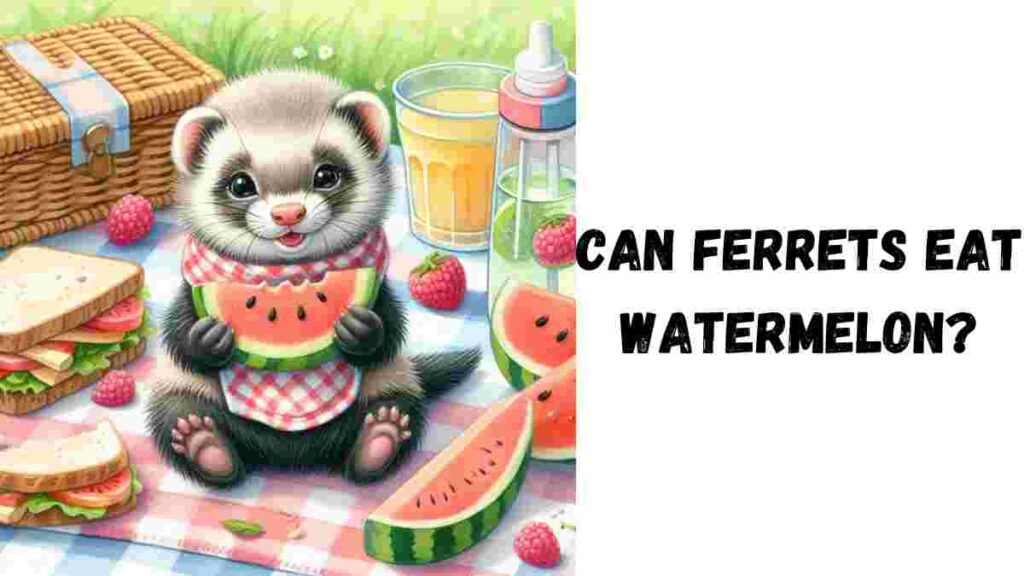Can Ferrets Eat Watermelon: Yes. Let’s find in detail, “Can Ferrets Eat Watermelon?” Ferrets, those playful and mischievous little creatures, are adored by many for their charm and inquisitive nature. Like with any pet, one essential aspect of ferret care involves understanding their dietary needs.
An often debated topic in the ferret owner community is whether watermelon should be a part of their diet. In this comprehensive guide, we will explore the ins and outs of feeding watermelon to ferrets, including the potential benefits and risks, as well as alternative treats to keep your ferret both healthy and happy.
Best Food For Your Rodent Friend
Get The Best Ferret Litter Deals Heret

Table of Contents
Ferrets and Their Diet
Understanding what a ferret eats in the wild is key to providing a balanced diet in captivity. In their natural habitat, ferrets are opportunistic carnivores, primarily devouring small mammals and birds. This means their digestive system is designed to extract nutrients efficiently from meat.
Typical Diet of Ferrets
The domestic ferret’s diet closely mimics that of their wild counterparts. High-protein meals, with fat and a small amount of carbohydrates, make up the bulk of a healthy ferret diet. Ferrets thrive on grain-free, meat-based commercial foods that are formulated to meet their specific nutritional needs.
Introducing Watermelon as a Snack
Can the occasional watermelon slice be a treat that both you and your ferret enjoy? It’s a divisive topic among ferret owners because of the fruit’s nutritional profile. While watermelon is not a staple in a ferret’s diet, when fed appropriately, it can be a refreshing and enjoyable snack.
Nutritional Benefits and Risks
Watermelon, a summertime favorite for many, is a rich source of hydration and certain nutrients that can be beneficial to ferrets. But with every treat, moderation is key.
Nutritional Content of Watermelon
Watermelon’s high water content makes it a good way to keep your ferret hydrated, especially during warmer months. It’s also a source of vitamins A, B6, and C, which support immune health. However, the sugar content in watermelon means it should be a rare treat rather than a regular occurrence, as ferrets are not well-equipped to process sugar.
Risks Associated with Feeding Watermelon to Ferrets
Ferrets are prone to digestive upset when introduced to new foods, especially those high in fiber or sugar. Feeding too much watermelon can lead to diarrhea and weight gain. The seeds and rind also pose a choking hazard and should be removed before serving.

Feeding Guidelines
When it comes to treats like watermelon, responsible pet ownership involves understanding the right way to offer them to your ferret.
Moderation and Frequency
A little watermelon flesh without the seeds or rind is acceptable. Feeding a small piece once in a while is a safe way to offer a novel taste without disrupting their digestion too much.
Preparation and Serving Suggestions
To serve watermelon to your ferret, ensure it’s ripe, wash it thoroughly, and remove seeds and rind. Cut the flesh into small, manageable pieces to avoid choking hazards and monitor their reaction closely.
Alternatives and Supplemental Treats
A varied diet can help keep your ferret healthy and engaged. Here are some safe alternatives to watermelon:
Safe Fruits and Vegetables for Ferrets
Small amounts of certain fruits and vegetables are safe to feed ferrets. Carrot slices, bananas, and occasional blueberries can offer variety and nutrients without causing harm.
Commercial Ferret Treats
Many commercial treats are specifically designed for ferrets, ensuring they meet their dietary needs more precisely than human food. These treats often come in a wide range of flavors and textures to keep your ferret stimulated and satisfied.
Conclusion – Can Ferrets Eat Watermelon?
Your ferret’s diet plays a crucial role in their overall well-being. If you decide to treat your ferret to watermelon, do so with attention to moderation and preparation. Always prioritize the foods that are part of a balanced and optimal ferret diet, and consult with a vet if you’re uncertain about a particular food item.
Ferrets, just like any pets, would benefit from a diet that’s varied and nutritionally sound. Balancing their meals between high-quality commercial foods, occasional safe treats like certain fruits and vegetables, and vet-approved supplements, will keep your ferret in the best health. Happy feeding and here’s to many more healthy, happy years of mischief with your ferret companion!

Frequently Asked Questions (FAQ) – Can Ferrets Eat Watermelon?
Can ferrets eat seeds or rind from watermelon?
No, ferrets should not eat the seeds or rind from watermelon. These parts can be hard to digest and pose a choking hazard. Always ensure to remove seeds and rind before feeding watermelon to your ferret.
How much watermelon can I feed my ferret?
Watermelon should only be given as an occasional treat due to its high sugar content. A small piece of watermelon flesh once in a while is sufficient. Too much can lead to digestive issues and weight gain.
Are there any signs I should watch for after feeding watermelon to my ferret?
After introducing watermelon, or any new treat, watch for signs of digestive upset, such as diarrhea or vomiting. If you notice any adverse reactions, discontinue feeding watermelon and consult your veterinarian.
What are some other fruits safe for ferrets?
In addition to watermelon (in moderation), small amounts of carrots, bananas, and occasional blueberries are safe for ferrets. Always introduce new foods gradually and in tiny quantities to monitor for any potential digestive issues.
Will feeding watermelon affect my ferret’s diet?
Watermelon should not replace any part of your ferret’s primary diet, which should be high in protein and low in carbohydrates. Treats like watermelon should only supplement a well-balanced diet appropriate for ferrets.
Can I feed commercial ferret treats to my ferret daily?
While commercial treats designed for ferrets can be a good addition to their diet, they should not be given daily. Treats should never make up more than 10% of your ferret’s diet to ensure they’re getting the nutrition they need from their primary food source.
